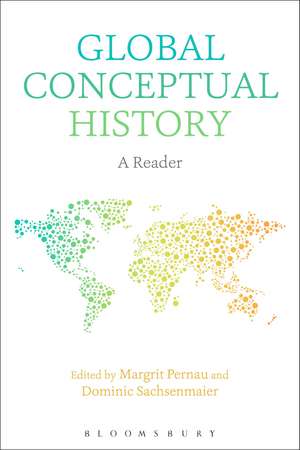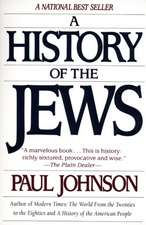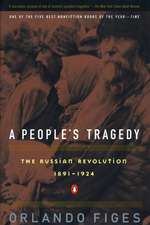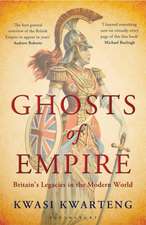Global Conceptual History: A Reader
Editat de Margrit Pernau, Dominic Sachsenmaieren Limba Engleză Paperback – 10 feb 2016
| Toate formatele și edițiile | Preț | Express |
|---|---|---|
| Paperback (1) | 255.51 lei 3-5 săpt. | |
| Bloomsbury Publishing – 10 feb 2016 | 255.51 lei 3-5 săpt. | |
| Hardback (1) | 835.93 lei 6-8 săpt. | |
| Bloomsbury Publishing – 10 feb 2016 | 835.93 lei 6-8 săpt. |
Preț: 255.51 lei
Preț vechi: 311.04 lei
-18% Nou
Puncte Express: 383
Preț estimativ în valută:
48.90€ • 50.51$ • 40.70£
48.90€ • 50.51$ • 40.70£
Carte disponibilă
Livrare economică 04-18 martie
Preluare comenzi: 021 569.72.76
Specificații
ISBN-13: 9781474242554
ISBN-10: 1474242553
Pagini: 400
Dimensiuni: 156 x 234 x 23 mm
Greutate: 0.59 kg
Editura: Bloomsbury Publishing
Colecția Bloomsbury Academic
Locul publicării:London, United Kingdom
ISBN-10: 1474242553
Pagini: 400
Dimensiuni: 156 x 234 x 23 mm
Greutate: 0.59 kg
Editura: Bloomsbury Publishing
Colecția Bloomsbury Academic
Locul publicării:London, United Kingdom
Caracteristici
Adopts a global approach, allowing conceptual historians to overcome their focus on single languages and instead look at transfers between nations and languages
Notă biografică
Margrit Pernau is Senior Researcher at the Max Planck Institute for Human Development, Berlin, Germany. She is the author of Ashraf Into Middle Classes: Muslims in Nineteenth-Century Delhi (2013) and co-author of Family and Gender: Changing Patterns of Family and Gender Values in Europe and India (2002).Dominic Sachsenmaier is Professor of Modern China with a Special Emphasis on Global Historical Perspectives at Georg-August-University Göttingen. He is the author of Global Perspectives on Global History (2011) and co-editor of Competing Visions of World Order: Global Moments and Movements (2007).
Cuprins
Introduction: Global History, Translation and Semantic Changes Margrit Pernau (Max Planck Institute for Human Development, Berlin, Germany), Dominic Sachsenmaier (Jacobs University, Germany)Part One: Classical Texts in Conceptual History1. "Introduction", in Basic Concepts of History, Reinhart Koselleck (University of Bielefeld, Germany)2. Social History and Conceptual History Reinhart Koselleck3. "Introduction", in Handbook of Sociopolitical Basic Concepts, Rolf Reichardt (University of Giessen, Germany)Part Two: Challenges4. Conceptual History or Discursive History? Some Remarks on the Theoretical Foundations and Methodological Questions of Historically Semantic Epistemologies Dietrich Busse (University of Düsseldorf, Germany)5. Rhetoric and Conceptual Change Quentin Skinner (Queen Mary, University of London, UK)Part Three: Translations of Concepts6. Translation as Cultural Transfer and Semantic Interaction: European Variations of Liberal between 1800 and 1830 Jörn Leonhard (University of Freiburg, Germany)7. Translation, Politics and Conceptual Change Kari Palonen (Academy of Finland)8. The Question of Meaning-Value in the Political Economy of the Sign Lydia Liu (Columbia University, USA)9. The Resonance of 'Culture': Framing a Problem in Global Concept-History Andrew Sartori (New York University, USA)10. The Conceptualization of the Social in Late Nineteenth- and Early Twentieth-century Arabic Thought and Language, Ilham Makdisi (Northeastern University, USA)11. Ustaarabu: A Conceptual Change in Tanganyikan Newspaper Discourse in the 1920s Katrin Bromber (Center for Modern Oriental Studies, Berlin, Germany)12. Pictures, Emotions, Conceptual Change: Anger in Popular Hindi Cinema Imke Rajamani (Max Planck Institute for Human Development, Berlin, Germany)Part Four: Outlook13. 40 Years of Conceptual History: The State of the Art Willibald Steinmetz (University of Bielefeld, Germany)Index
Recenzii
Moving from classic essays on the contours of conceptual history to the prospect of the globalization of this approach - and challenges it must surmount - this excellent volume provides readers a superlative introduction to how a field is adapting itself for a new historiographical moment. Margrit Pernau and Dominic Sachsenmaier deserve considerable thanks for so artfully curating a collection that will inform scholars and educate students about what makes Reinhart Koselleck's Begriffsgeschichte distinctive, just as it will prompt them to reflect on whether the approach is up to the challenge of a necessarily multilingual global space.
Global Conceptual History provides an essential foundation for realizing the transnational and global potential of the field. From key discussions of methodology by Koselleck and Reichhardt to finely researched investigations of the history of concepts in the Middle East, South Asia, and elsewhere, the collection makes the case that conceptual history should be conducted on a global scale with the problem of translation at its heart.
This volume offers compelling confirmation of the coming of age of conceptual history which, although a branch of study that emanated from Europe, has now become truly transnational. The transfer, modification, and redescription of concepts-through the languages in which they are embedded-shape both vernacular and professional interpretations of social and political realities across cultures and through time. The editors are to be congratulated for assembling an excellent collection of essays that combine the theoretical roots of conceptual history with illuminating case-studies. It is an important and highly recommended introduction to the increasing variety and subtlety of the field.
Global Conceptual History provides an essential foundation for realizing the transnational and global potential of the field. From key discussions of methodology by Koselleck and Reichhardt to finely researched investigations of the history of concepts in the Middle East, South Asia, and elsewhere, the collection makes the case that conceptual history should be conducted on a global scale with the problem of translation at its heart.
This volume offers compelling confirmation of the coming of age of conceptual history which, although a branch of study that emanated from Europe, has now become truly transnational. The transfer, modification, and redescription of concepts-through the languages in which they are embedded-shape both vernacular and professional interpretations of social and political realities across cultures and through time. The editors are to be congratulated for assembling an excellent collection of essays that combine the theoretical roots of conceptual history with illuminating case-studies. It is an important and highly recommended introduction to the increasing variety and subtlety of the field.












